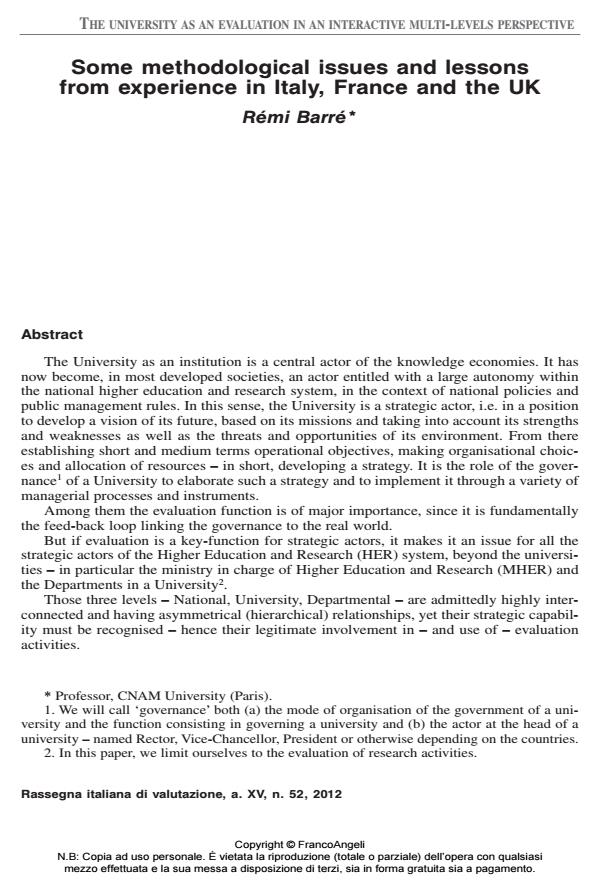Some methodological issues and lessons from experience in Italy, France and the UK
Titolo Rivista RIV Rassegna Italiana di Valutazione
Autori/Curatori Remì Barrè
Anno di pubblicazione 2013 Fascicolo 2012/52 Lingua Italiano
Numero pagine 17 P. 9-25 Dimensione file 504 KB
DOI 10.3280/RIV2012-052002
Il DOI è il codice a barre della proprietà intellettuale: per saperne di più
clicca qui
Qui sotto puoi vedere in anteprima la prima pagina di questo articolo.
Se questo articolo ti interessa, lo puoi acquistare (e scaricare in formato pdf) seguendo le facili indicazioni per acquistare il download credit. Acquista Download Credits per scaricare questo Articolo in formato PDF

FrancoAngeli è membro della Publishers International Linking Association, Inc (PILA)associazione indipendente e non profit per facilitare (attraverso i servizi tecnologici implementati da CrossRef.org) l’accesso degli studiosi ai contenuti digitali nelle pubblicazioni professionali e scientifiche
The University as an institution is a central actor of the knowledge economies. It has now become, in most developed societies, an actor entitled with a large autonomy within the national higher education and research system, in the context of national policies and public management rules. In this sense, the University is a strategic actor, i.e. in a position to develop a vision of its future, based on its missions and taking into account its strengths and weaknesses as well as the threats and opportunities of its environment. From there establishing short and medium terms operational objectives, making organisational choices and allocation of resources - in short, developing a strategy. It is the role of the governance1 of a University to elaborate such a strategy and to implement it through a variety of managerial processes and instruments. Among them the evaluation function is of major importance, since it is fundamentally the feed-back loop linking the governance to the real world. But if evaluation is a key-function for strategic actors, it makes it an issue for all the strategic actors of the Higher Education and Research (HER) system, beyond the universities - in particular the ministry in charge of Higher Education and Research (MHER) and the Departments in a University2. Those three levels - National, University, Departmental - are admittedly highly interconnected and having asymmetrical (hierarchical) relationships, yet their strategic capability must be recognised - hence their legitimate involvement in - and use of - evaluation activities. The objective of this paper is - focussing on the University as an evaluation actor - to identify and discuss the question of its relationships, in terms of evaluation activities, with University Departments on one side and with the MHER on the other - which are both evaluation actors as well. Our standpoint is to refer to evaluation methodologies and our examples will mostly be based on the evaluation activities of the UNIMIL, as well as those taking place in France, at various levels. We also make some references to the evaluation implications of the Bologna process. In a first paragraph, we give an overview of the relationships among the evaluation actors of the different levels; in a second and third paragraph, we focus on the relationships of a university with the departmental and national level, respectively, discussing some methodological issues, concluding then on the stakes which a university faces as an evaluation actor.;
Keywords:Research evaluation, University evaluation, multilevel evaluation
Remì Barrè, Some methodological issues and lessons from experience in Italy, France and the UK in "RIV Rassegna Italiana di Valutazione" 52/2012, pp 9-25, DOI: 10.3280/RIV2012-052002